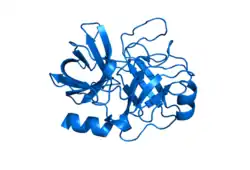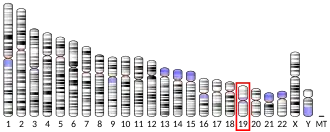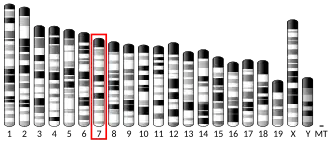Kallikrein-8 is a protein that in humans is encoded by the KLK8 gene.[5][6][7][8][9]
Kallikreins are a subgroup of serine proteases having diverse physiological functions. Growing evidence suggests that many kallikreins are implicated in carcinogenesis and some have potential as novel cancer and other disease biomarkers. This gene is one of the fifteen kallikrein subfamily members located in a cluster on chromosome 19. Alternate splicing of this gene results in four transcript variants encoding four different isoforms. The isoforms exhibit distinct patterns of expression that suggest roles in brain plasticity and ovarian cancer.[9]
References
- ^ a b c GRCh38: Ensembl release 89: ENSG00000129455 – Ensembl, May 2017
- ^ a b c GRCm38: Ensembl release 89: ENSMUSG00000064023 – Ensembl, May 2017
- ^ "Human PubMed Reference:". National Center for Biotechnology Information, U.S. National Library of Medicine.
- ^ "Mouse PubMed Reference:". National Center for Biotechnology Information, U.S. National Library of Medicine.
- ^ Mitsui S, Tsuruoka N, Yamashiro K, Nakazato H, Yamaguchi N (March 1999). "A novel form of human neuropsin, a brain-related serine protease, is generated by alternative splicing and is expressed preferentially in human adult brain". European Journal of Biochemistry. 260 (3): 627–634. doi:10.1046/j.1432-1327.1999.00213.x. PMID 10102990.
- ^ Yoshida S, Taniguchi M, Hirata A, Shiosaka S (June 1998). "Sequence analysis and expression of human neuropsin cDNA and gene". Gene. 213 (1–2): 9–16. doi:10.1016/S0378-1119(98)00232-7. PMID 9714609.
- ^ Lundwall A, Band V, Blaber M, Clements JA, Courty Y, Diamandis EP, et al. (June 2006). "A comprehensive nomenclature for serine proteases with homology to tissue kallikreins". Biological Chemistry. 387 (6): 637–641. doi:10.1515/BC.2006.082. PMID 16800724. S2CID 436200.
- ^ Diamandis EP, Deperthes D, Lundwall Å (June 2006). "Proceedings of the 1st International Symposium on Kallikreins, Lausanne, Switzerland, September 1-3 , 2005". Biological Chemistry. 387 (6): 635–824. doi:10.1515/BC.2006.081. PMID 16800723. S2CID 83910246.
- ^ a b "Entrez Gene: KLK8 kallikrein-related peptidase 8".
Further reading
- Underwood LJ, Tanimoto H, Wang Y, Shigemasa K, Parmley TH, O'Brien TJ (September 1999). "Cloning of tumor-associated differentially expressed gene-14, a novel serine protease overexpressed by ovarian carcinoma". Cancer Research. 59 (17): 4435–4439. PMID 10485494.
- Gan L, Lee I, Smith R, Argonza-Barrett R, Lei H, McCuaig J, et al. (October 2000). "Sequencing and expression analysis of the serine protease gene cluster located in chromosome 19q13 region". Gene. 257 (1): 119–130. doi:10.1016/S0378-1119(00)00382-6. PMID 11054574.
- Magklara A, Scorilas A, Katsaros D, Massobrio M, Yousef GM, Fracchioli S, et al. (April 2001). "The human KLK8 (neuropsin/ovasin) gene: identification of two novel splice variants and its prognostic value in ovarian cancer". Clinical Cancer Research. 7 (4): 806–811. PMID 11309326.
- Clark HF, Gurney AL, Abaya E, Baker K, Baldwin D, Brush J, et al. (October 2003). "The secreted protein discovery initiative (SPDI), a large-scale effort to identify novel human secreted and transmembrane proteins: a bioinformatics assessment". Genome Research. 13 (10): 2265–2270. doi:10.1101/gr.1293003. PMC 403697. PMID 12975309.
- Cané S, Bignotti E, Bellone S, Palmieri M, De las Casas L, Roman JJ, et al. (January 2004). "The novel serine protease tumor-associated differentially expressed gene-14 (KLK8/Neuropsin/Ovasin) is highly overexpressed in cervical cancer". American Journal of Obstetrics and Gynecology. 190 (1): 60–66. doi:10.1016/j.ajog.2003.07.020. PMID 14749636.
- Shigemasa K, Tian X, Gu L, Tanimoto H, Underwood LJ, O'Brien TJ, et al. (June 2004). "Human kallikrein 8 (hK8/TADG-14) expression is associated with an early clinical stage and favorable prognosis in ovarian cancer". Oncology Reports. 11 (6): 1153–1159. doi:10.3892/or.11.6.1153. PMID 15138549.
- Li Y, Qian YP, Yu XJ, Wang YQ, Dong DG, Sun W, et al. (November 2004). "Recent origin of a hominoid-specific splice form of neuropsin, a gene involved in learning and memory". Molecular Biology and Evolution. 21 (11): 2111–2115. doi:10.1093/molbev/msh220. PMID 15282331.
- Rajapakse S, Ogiwara K, Takano N, Moriyama A, Takahashi T (December 2005). "Biochemical characterization of human kallikrein 8 and its possible involvement in the degradation of extracellular matrix proteins". FEBS Letters. 579 (30): 6879–6884. Bibcode:2005FEBSL.579.6879R. doi:10.1016/j.febslet.2005.11.039. hdl:2115/985. PMID 16337200. S2CID 22439153.
- Kishi T, Cloutier SM, Kündig C, Deperthes D, Diamandis EP (June 2006). "Activation and enzymatic characterization of recombinant human kallikrein 8". Biological Chemistry. 387 (6): 723–731. doi:10.1515/BC.2006.091. PMID 16800733. S2CID 19299456.
- Sher YP, Chou CC, Chou RH, Wu HM, Wayne Chang WS, Chen CH, et al. (December 2006). "Human kallikrein 8 protease confers a favorable clinical outcome in non-small cell lung cancer by suppressing tumor cell invasiveness". Cancer Research. 66 (24): 11763–11770. doi:10.1158/0008-5472.CAN-06-3165. PMID 17178872.
- Lu ZX, Peng J, Su B (October 2007). "A human-specific mutation leads to the origin of a novel splice form of neuropsin (KLK8), a gene involved in learning and memory". Human Mutation. 28 (10): 978–984. doi:10.1002/humu.20547. PMID 17487847. S2CID 6001199.
External links
- The MEROPS online database for peptidases and their inhibitors: S01.244




